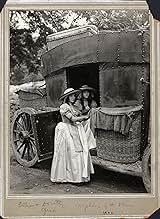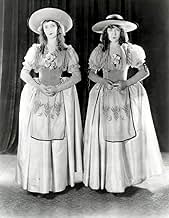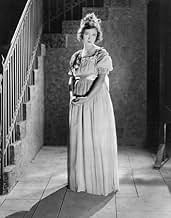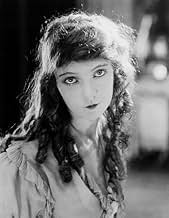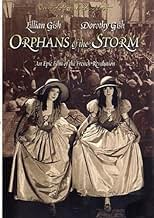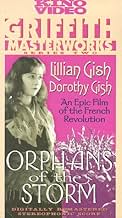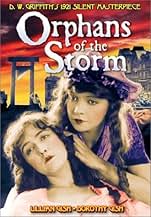Dos hermanas huérfanas se ven envueltas en la confusión de la Revolución Francesa, encontrando miseria y amor en el camino.Dos hermanas huérfanas se ven envueltas en la confusión de la Revolución Francesa, encontrando miseria y amor en el camino.Dos hermanas huérfanas se ven envueltas en la confusión de la Revolución Francesa, encontrando miseria y amor en el camino.
- Dirección
- Guionistas
- Elenco
- Premios
- 1 premio ganado en total
- Dirección
- Guionistas
- Todo el elenco y el equipo
- Producción, taquilla y más en IMDbPro
Opiniones destacadas
But Griffith's vision of the French Revolution is naive,to put it mildly.He was not apparently aware that the 1789 events were mainly a bourgeois move,and the poor were only a tool.The dichotomy Good Danton/Wicked Robespierre should make people who are looking for a sort of historical accuracy have a look at Wajda"s "Danton"(with G.Depardieu,in the eighties).
Forget history and you have a two-hour and a half silent movie with never a dull moment.Griffith is a wonderful storyteller,who had a great respect for his audience.Some sequences are still impressive today:the aristocratic orgy,when the Poor are starving at the gates of the palace is far from D'Ennery's timid depiction of the scene in the book;Lillian Gish,a wonderful actress who 'd been part of the cinema till the eighties,is so powerful in her part of the abducted maiden Henriette we can almost hear her when she screams out of despair:"is there a man of honor among you?Louise and the shrew who got her under her thumb begging in front of the cathedral as the snow is falling is a splendid picture,recalling a painter's work;even if Danton's coming to the rescue of a soon-to-be guillotined Henriette is thoroughly implausible,we cannot help but admire the director's maestria.
Few silent movies have stood the test of time as well as this one.
As a long-time maven of silent films, I have no problem placing myself in that era and enjoying these movies on their own terms. Much has changed since those days, and most folks simply cannot appreciate the simplicity AND complexity of photoplays without words.
This film is magnificent and entertaining. I am not a fan of most "period pieces", but this transcends the typical fare. Check it out.
Orphans of the Storm is rather lazily-written, full of one-dimensional characters, predictable situations, and sudden coincidences leaping over gaps in the plot, as two sisters, one of them blind, lose each other, find each other, then lose each other again amid the chaos of the French Revolution. However, it's (just about) possible to overlook a bad story so long as it's well told. Unfortunately, Griffith appears to be following the trend of having more and longer title cards, explaining every point and feeding us superficial lines of dialogue, where the action alone should tell us what is going on. In some scenes, such as those where Dorothy Gish's blindness is brought up, we get the worst of both worlds, having not only the point-labouring title cards, but also exaggerated pantomiming, with characters pointing emphatically at both eyes.
Griffith should have known that all his best moments were wordless and understated. Thankfully, he has not forgotten how to direct a good love scene, and those between Joseph Schildkraut and Lillian Gish are particularly effective, framed plainly in a series of close-ups, barely moving their faces but conveying a world of emotion. This was Schildkraut's first American picture, and he is one of the most pleasingly natural and convincing lead men Griffith had worked with thus far. With his fine, sharp features he was also appropriately handsome, although a few films later he would play Judas in King of Kings, and subsequently became a bit typecast. As for Gish, she is far more satisfying here in one of her serene and sensible roles, as opposed to the hysterical girly parts she was increasingly given. The other standout in this cast is Monte Blue as Danton, whipping a crowd into a frenzy without once resorting to hamminess.
It was a long-established rule that every major Griffith picture had to feature a battle somewhere in the middle, and end with a climactic ride-to-the-rescue. By 1921 these action sequences were becoming a trifle uninspired. The battle between revolutionaries and soldiers has a great build-up, but then resorts to bland god-shots, making the moment suddenly seem very cold. The finale is one of Griffith's least engaging, I think because while the ride itself is excitingly shot and edited, the business at the guillotine is just a lot of faffing around, a far cry from Bobby Haron's haunting walk to the scaffold in Intolerance.
In spite of all this, Orphans of the Storm – like every Griffith feature I have seen – does have its absolutely divine moments. There's a very dynamic sense of rhythm to the scene at the ball and the later celebration of the victorious revolutionaries. The reunion of Schildkraut and Lillian Gish is both powerful and sensitive. Griffith may have been beginning to slip, but at least he was failing beautifully.
"Orphans of the Storm" is another magnificent epic by D. W. Griffith and his last success. The film impresses in many aspects, such as the screenplay, the set locations and fantastic camera work, with impressive angles considering the size of the cameras and the technology in the early Twentieth Century. The plot is a combination of heavy drama, romance and action and sensitive viewers will certainly need a handkerchief to see the touching scenes of the sisters set apart. The suspenseful conclusion, with Danton and his men trying to deliver the pardon of Henriette and Chevalier de Vaudrey, is suspenseful and thrilling. The lovely Lilian Gish is another attraction with a wonderful performance. Last but not the least, "Orphans of the Storm" is a mandatory film for any cinema lover. My vote is nine.
Title (Brazil): "Órfãs da Tempestade" ("Orphans of the Storm")
History's sweeping drama comes alive in this powerful epic film from legendary silent movie genius D. W. Griffith. Although much happens on a broad canvas, the director never loses sight of the intimate details of the heroines' pitiful plight. In denouncing tyranny, Griffith always manages to keep the viewer engrossed in how the State's insidious evil affects the individual.
Much of the film's success is due to the remarkable acting of the Gish Sisters, Lillian & Dorothy. Acclaimed for her comedic talents, Dorothy here gives an almost completely serious performance, portraying a blind girl cruelly separated from her beloved sister and forced to beg in the streets. Lillian, her classic face mirroring a myriad of emotions, plays the sibling persecuted by both lecherous aristocrats and rapacious revolutionaries. The scene in which Lillian, in an upper chamber, hears Dorothy singing in the alley below but is unable to reach her, is almost unbearable in its emotional intensity.
A young Joseph Schildkraut plays Lillian's blue-blooded suitor, giving the viewer an intimation of the very fine character actor he would become with the advent of talking pictures. Lucille LaVerne steals more than a few scenes as the filthy harridan who enslaves and terrorizes Dorothy. Frank Puglia makes a poignant mark as Miss LaVerne's pathetic, downtrodden son. Comic actor Creighton Hale gives a lively performance in a small role as a mischievous, periwiged servant.
A fascinating aspect of the film is its vivid rendering of two historical characters of great significance in the history of France. Georges Danton was probably not as noble as he is portrayed by Monte Blue, nor was Maximilien Robespierre necessarily as evil as Sidney Herbert depicts him. What is certain is that both men were responsible for the deaths of thousands of individuals during the Reign of Terror. Fittingly, each man had his own rendezvous with Madame Le Guillotine in 1794.
Movie mavens will recognize an unbilled Louis Wolheim as the executioner awaiting Miss Lillian on the scaffold.
Griffith handles the sequences involving surging masses of extras with admirable dexterity. He also freely borrows a few plot elements from Dickens' A Tale of Two Cities. In fact Miss LaVerne, with scarcely a costume change, would play the role of The Vengeance in MGM's 1935 version of that classic, violent novel.
¿Sabías que…?
- TriviaWilliam J. Walsh, an extra playing a soldier, was killed on set when a prop rifle he was leaning on went off by accident; although the weapon was loaded with a blank cartridge, the wadding from a blank fired at point-blank range is capable of inflicting serious injury or death.
- ErroresWhen the Bastille is taken, the prisoners are freed. There are many of them. In reality, only seven prisoners were freed during the taking of the Bastille.
- Citas
Title Card: [Opening lines] TIME, - Before and during the French Revolution. Our story is of two little orphans who suffer first through the tyranny - selfishness - of Kingly bosses, nobles and aristocrats. After the King's Government falls they suffer with the rest of the people as much through the new Government, established by the pussy-footing Robespierre through Anarchy and Bolshevism. Strange that both these evil rulers were otherwise highly moral men except that they saw evil in all who did not THINK AS THEY DID. The lesson - the French Revolution RIGHTLY overthrew a BAD government. But we in America should be careful lest we with a GOOD government mistake fanatics for leaders and exchange our decent law and order for Anarchy and Bolshevism.
- Créditos curiososThe starring Gish sisters are not listed in the opening credits. They are introduced on title cards as "Louise--Miss Dorothy Gish" and "Henriette--Miss Lillian Gish."
- ConexionesEdited into Capital in the Twenty-First Century (2019)
Selecciones populares
- How long is Orphans of the Storm?Con tecnología de Alexa
Detalles
- Fecha de lanzamiento
- País de origen
- Idioma
- También se conoce como
- Orphans of the Storm
- Locaciones de filmación
- Mamaroneck, Nueva York, Estados Unidos(D.W. Griffith: Father of Film)
- Productora
- Ver más créditos de la compañía en IMDbPro
Taquilla
- Presupuesto
- USD 1,000,000 (estimado)
- Tiempo de ejecución
- 2h 30min(150 min)
- Mezcla de sonido
- Relación de aspecto
- 1.33 : 1



